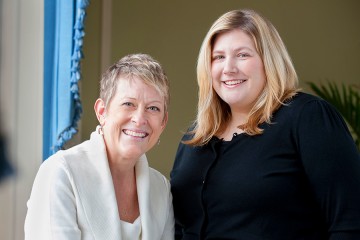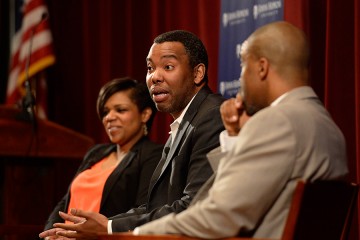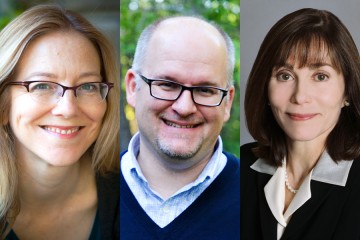In the thick of Baltimore's chaos two weeks ago, a group of Johns Hopkins University faculty members started emailing one another.
"We looked around and said, 'Where's the Hopkins response to this?'" says Stephen Morgan, a professor of sociology and education.
From that came a meeting of a "truly cross-campus set of people," says Morgan, brainstorming research projects that could help "understand what was going on, why it happened, and how to engage going forward."
Under the umbrella of the university's 21st Century Cities Initiative, researchers have launched a cadre of projects examining Baltimore's dynamics in relation to the unrest following Freddie Gray's death. Researchers plan, for example, to conduct on-the-ground research at the Mondawmin Mall and its surrounding community in West Baltimore, where police in riot gear clashed with adolescents on April 27. They're also investigating Twitter activity surrounding the call to "purge" that reportedly played a role in inciting violence.
"We're trying to reimagine what a research university can do in the face of a crisis like this," says Kathryn Edin, a sociologist in the Krieger School of Arts and Sciences who was recently named director of the 21st Century Cities Initiative.
Known in shorthand as "21CC," the initiative started just last winter as a reboot of the former Institute of the American City. The interdisciplinary effort aims to look broadly at "revitalizing American cities" such as Pittsburgh, Detroit, and Chicago, Edin says, applying both local and global solutions. Morgan works with the Center for Government Excellence, an 21CC outgrowth that creates data infrastructures to transform how city governments operate. Both he and Edin joined Johns Hopkins last year as Bloomberg Distinguished Professors, world-class scholars with a focus on cross-specialty collaboration. Hopkins is now home to a total of 10 Bloomberg Distinguished Professors, a number that is expected to swell to 50 within the next four years. The endowed professorships are supported by a $350 million gift from alumnus Michael R. Bloomberg, Class of 1964.
Though interest in Baltimore is expected, given that it's 21CC's home base, recent events "have sharpened our focus on Baltimore," Edin says. "Even though the events were extraordinarily tragic, we are incredibly fortunate to be in the position to deploy our skills in this way."
The new research is not of the slow-burning variety that's often seen in academia, but a "rapid response" that should produce tangible results this summer in the form of papers and briefs. Edin spoke of the practical nature of this timeline. "Four years out, findings on the unrest in Baltimore will be very useful for academics, but it won't be very useful for the city as it moves forward and tries to improve things."
Dozens of student and faculty researchers are involved—and more are needed—for eight projects total.
On the quantitative side, says Morgan, "Team Scanner" is looking at scans of police channels in Baltimore from two weeks ago, focusing on calls reporting officer distress. "We need a sense of the timing and tempo of police response to those incidents," he says.
"Team School," under the guidance of the Baltimore Education Research Consortium, will investigate the dynamics at Frederick Douglass High School, which was thrust into the spotlight because of its central location amid the riots, and the activity of some of its students. "How does that high school differ from many others? It may or may not," Morgan says.
"Team CGE" (referencing the Center for Government Excellence) will assist other teams in gathering information on the Mondawmin Mall transportation hub, assessing the significance of bus service disruptions there two weeks ago. And "Team Social Media" will examine the impact of the aforementioned "purge" flier, which alluded to a 2013 movie where all crime is legal for one day. Morgan and a partner with Microsoft Research New York City hope to discover, through Twitter data, "the number of people who saw that poster, where they were, and what their reactions were."
Edin, meanwhile, is heading the qualitative research with sociology professor Stefanie DeLuca, who serves on the 21CC steering committee.
One project will involve "old-fashioned ethnographic research" at Mondawmin Mall and surrounding areas. "We'll send field workers … to have informal interactions and in-depth conversations with kids," Edin says. "How are these kids feeling about how they've been portrayed in the media? How are things changing on the ground? Do they sense that police are treating them differently? What about kids who were there and didn't participate?"
Two other projects will examine housing issues in Baltimore. "The story coming out of media is that when you grow up around all this abandoned housing, you feel almost socially worthless," Edin says. The goal, she says, is "to figure out how to stem the blight and create neighborhood conditions more conducive to well-being and health."
One of those studies takes the long view, "an autopsy of vacant housing" in Baltimore, Edin says, which spiked in the 1970s and '80s and again during the recession in the mid-2000s. This will involve archival research and collecting oral histories of landlords from past years. In another study, "we're really bearing down on all those landlords who are providing housing for the poorest of the poor," Edin says, examining the various quandaries they face.
Finally, another study looks at families living in extreme poverty in Baltimore, using surveys and interviews "to capture the texture of the lives of these folks—how they survive economically, and how kids' health and development may be affected," Edin says. She notes that 15 undergraduate interns at Johns Hopkins have already been hired to assist with the research.
Posted in University News, Politics+Society
Tagged interdisciplinary research, 21st century cities, baltimore unrest











